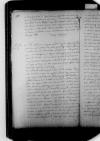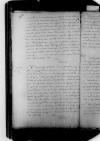Letter #425
Alfonso de VALDÉS to Ioannes DANTISCUSToledo, 1529-02-14
English register:
Valdés is happy about Dantiscus’ letter. He writes of his adoration for him. He expresses the fear that Lalemand will escape punishment because other influential scoundrels like him are working for his benefit; luckily the emperor [Charles V] has decided he will not be admitted to the court anymore. The chancellor [Mercurino Gattinara] liked Dantiscus’ texts [the epicedium and epitaph] about Lalemand very much and so did all their friends. Valdés impatiently awaits the remaining promised texts. He worries that he cannot send Dantiscus a copy of his dialogue about the sack of Rome for review, nor his text about the duel (ratio singularis certaminis), because Ioannes[Juan Saganta?] is seriously ill while the other scribe [Gonzalo Peréz?] is busy at the chancellery. He guesses, however, that these texts won’t be published in print anytime soon. He considers Lalemand’s imprisonment and the violent death of the papal nuncio [Baldassare Castiglione] to be divine punishment for criticism of the dialogue. Valdés and his friends found the story about the bishop of Osma (Oxomensis) [Juan García de Loaysa y Mendoza] amusing, he thinks it is worthy of being included in Pasquillus.
The chancellor was extremely happy about Dantiscus’ letter, he has agreed to all his corrections to the privilege [i.e. the document granting him the title of eques auratus]. Dantiscus is in his good graces. Valdés sends Dantiscus the privilege and a letter to the king [Sigismund I, i.e. a new version of the document releasing Dantiscus from service at the imperial court]. Valdés replies to Dantiscus’ question about Alfonso de Virues – he is friends with him, values his virtues greatly, and forgives his faults. He’s told Dantiscus before that he mediated in appeasing a conflict between Virues and Erasmus [of Rotterdam]. The rumor of the emperor’s planned departure for Granada is false – he will leave Toledo on March 1 for Monserrat, where he will spend Easter and then sail for Italy early in May.
Valdés comments on the story of the pregnant hermaphrodite monk. As he was writing this letter, he was surprised by Perrenot, who read Dantiscus’ letter and they laughed sardonically together. Perrenot sends his regards to Dantiscus even though he wasn’t mentioned by him. The chancellor’s cousins also send their regards: Bartholomaeus, Hieronymus a Ranzo, Georgius who has just arrived from Italy, and Iacobus a Gattinaria, as well as the Genevan official, (officialis Gebenensis) [Eustace Chapuys] and A(ntonius) Longus. Marliano will write to him as promised, and Suarez sends as many regards as there are lies in Marcus Aurelius. Valdés sends his regards to Isabel [Delgada] and the children [Juana Dantisca and Juan Dantisco].
| received Valladolid, [1529]-02-18 Manuscript sources:
Auxiliary sources:
Prints:
| ||||||||||||||||||||||||
Text & apparatus & commentary Plain text Text & commentary Text & apparatus
print 1 Clarissimo viro, Domino Ioanni Dantisco serenissimi regis Poloniae oratori etc.,
ms 1 2 omitted⌈Clarissimo viro, Domino
ms 1 2 omitted⌉
Salutem plurimam.
Non est, cur neque ego apud te, neque tu
vicissim apud me pluribus verbis utamur, cum nota explorataque
utrique nostrum sit mutua inter nos benevolentia vel potius mea in
te pietas, quam si<c> ut animo concepi, ita print 1 et,
ms 1 ut,
ms 2 aut⌈etprint 1 et,
ms 1 ut,
ms 2 aut⌉
verbis exprimere aut operibus comprobare daretur,
sat, scio, diceres spe tua te aut opinione minime frustratum esse. Quam mihi
print 1 fuerint,
ms 1 fuerint,
ms 2 fuerunt⌈fuerintprint 1 fuerint,
ms 1 fuerint,
ms 2 fuerunt⌉ tuae cf.
print 1 exosculor,
ms 2 exosculor⌈exosculerms 1 exosculer,
print 1 exosculor,
ms 2 exosculor⌉ suscipiamque.
De  BK 222, No. 52, p. 196ris certaminis ad te mittere possim, nam alium probably
BK 222, No. 52, p. 196ris certaminis ad te mittere possim, nam alium probably
Fabula
ms 1 Oxomensis,
ms 2 Oxemen⌈Oxomensisprint 1 Oxomensis,
ms 1 Oxomensis,
ms 2 Oxemen⌉
ms 1 ea,
ms 2 eam⌈eaprint 1 ea,
ms 1 ea,
ms 2 eam⌉ ego a Pasquillo exspecto. Vix
crederes, quam fuerint
ms 1 Vernesius,
ms 2 Vernusius⌈Viruesiusprint 1 Viruesius,
ms 1 Vernesius,
ms 2 Vernusius⌉
ms 1 redditum,
ms 2 reditum⌈reditumprint 1 reditum,
ms 1 redditum,
ms 2 reditum⌉ est in gratiam. Multa sunt, quae in homine merito placent, sed et
alia, quae iure displicent. Quod dat, accipimus, cetera devoramus,
ita vivendum est.
Hic quoque rumor erat,
print 1 si Deus concesserit,
ms 2 si Deus concesserit⌈(si Deus concesserit)ms 1 (si Deus concesserit),
print 1 si Deus concesserit,
ms 2 si Deus concesserit⌉
navigaturus. Ita decretum est.
De monacho praegnante nihil aliud scio,
quam illum print 1 hermaphroditum,
ms 1 hermaphroditum,
ms 2 Hermophroditum⌈hermaphroditumprint 1 hermaphroditum,
ms 1 hermaphroditum,
ms 2 Hermophroditum⌉
esse iamque septimo mense foetum gestare. Ego certe non tantum
admiror factum, sed qui fieri potuit, ut  BK 222, No. 52, p. 197 inter tot distensos monachos concipere potuerit, aut cur eadem opera non concipiunt meretrices. Neque enim credendum est
in tali officina segniorem operam illum aut, si mavis, illam navasse.
Cum haec scriberem, deprehendit me dominus
BK 222, No. 52, p. 197 inter tot distensos monachos concipere potuerit, aut cur eadem opera non concipiunt meretrices. Neque enim credendum est
in tali officina segniorem operam illum aut, si mavis, illam navasse.
Cum haec scriberem, deprehendit me dominus
ms 1 2 Permotus⌈Perrenotusprint 1 Perrenotus,
ms 1 2 Permotus⌉
ms 2 dicerem,
ms 1 dicere⌈diceremprint 1 dicerem,
ms 2 dicerem,
ms 1 dicere⌉, tametsi de eo nulla sit tuis in litteris mentio. Idem petiit dominus
probably
ms 1 2 Panso⌈Ranzoprint 1 Ranzo,
ms 1 2 Panso⌉
ms 1 nepos,
ms 2 nepos⌈nepotesprint 1 nepotes,
ms 1 nepos,
ms 2 nepos⌉,
ms 1 Gebenensis,
ms 2 Gedanensis⌈Gebennensisprint 1 Gebennensis,
ms 1 Gebenensis,
ms 2 Gedanensis⌉
ms 1 ... gap left by scribe,
ms 2 dominae Isabellae⌈Isidiprint 1 Isidi,
ms 1 ... gap left by scribe,
ms 2 dominae Isabellae⌉
Vale.
ms 1 XIIII,
ms 2 decima quarta⌈XIIIIprint 1 XIIII,
ms 1 XIIII,
ms 2 decima quarta⌉ Februarii print 1 1529,
ms 1 1529,
ms 2 millesimo quingentesimo vigesimo nono⌈1529print 1 1529,
ms 1 1529,
ms 2 millesimo quingentesimo vigesimo nono⌉.
Tuus


